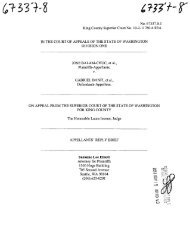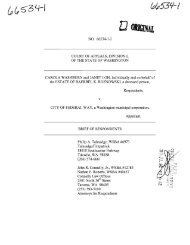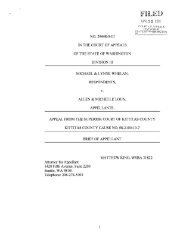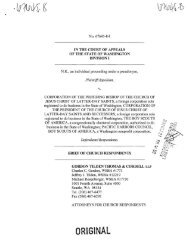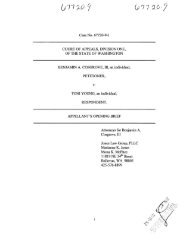Appellant's Brief - Washington State Courts
Appellant's Brief - Washington State Courts
Appellant's Brief - Washington State Courts
Create successful ePaper yourself
Turn your PDF publications into a flip-book with our unique Google optimized e-Paper software.
Furthermore, we have recognized two competing<br />
policies in cases where the emergency exception is<br />
invoked: (1) allowing police to help people who are<br />
injured or in danger and (2) protecting citizens against<br />
unreasonable searches. . . In each case, we must<br />
balance these policies in light of the facts and<br />
circumstances. (Cites omitted.)<br />
Johnson, supra, at 417-18.<br />
The courts must balance the individual's interest in freedom<br />
from governmental intrusion against the governmental interests<br />
which justify the intrusion. For example, the <strong>State</strong> interests of<br />
"effective crime prevention and detection and exigent<br />
circumstances" support a reasonable detention under Terry v. Ohio,<br />
392 U .S. 1, 88 S. Ct. 1868, 20 L. Ed.2d 889 (1 968). <strong>State</strong> v,<br />
Duncan, 146 Wn.2d 166, 176,43 P.3d 513 (2002).<br />
In his brief, Smith discusses exigent circumstances,<br />
including the six factors identified by the Cardenas court as those<br />
the court uses in considering whether a warrantless entry was<br />
justified:<br />
(1) the gravity or violent nature of the offense with<br />
which the suspect is to be charged; (2) whether the<br />
suspect is reasonably believed to be armed; (3)<br />
whether there is reasonably trustworthy information<br />
that the suspect is guilty; (4) there is strong reason to<br />
believe that the suspect is on the premises; (5) a<br />
likelihood that the suspect will escape if not swiftly<br />
apprehended; and (6) the entry is made peaceably.



